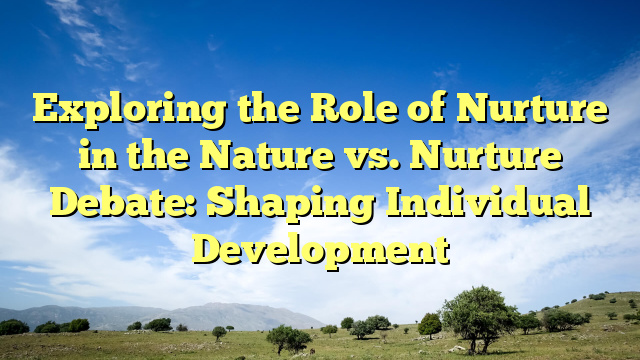Exploring the Role of Nurture in the Nature vs. Nurture Debate: Shaping Individual Development
“`html
Exploring the Role of Nurture in the Nature vs. Nurture Debate: Shaping Individual Development
The nature vs. nurture debate is a longstanding discussion within psychology, sociology, and genetics, focusing on the relative contributions of genetic inheritance (nature) and environmental factors (nurture) to human development. While nature refers to biological/genetic predispositions, nurture encompasses all environmental influences after conception, including experiences, education, and culture. This article delves into the role of nurture in shaping individual development, highlighting its significance in various aspects of human growth.
The Impact of Nurture on Personality Development
Personality development is a core area where nurture plays a crucial role. Environmental factors, interactions with family members, educational experiences, and cultural background significantly influence the development of an individual’s personality.
Family Influence
Family is the first agent of socialization a child encounters, and it has a profound impact on personality traits. Parenting styles, for example, can affect a child’s confidence, self-esteem, and social skills.
Educational Experiences
Schools and educational systems offer structured environments where individuals not only acquire knowledge but also develop social skills, work ethics, and other personality traits that are crucial for personal and professional life.
Cultural Background
Culture shapes individuals by instilling values, beliefs, and norms that influence their behaviors and thought processes. Cultural diversity introduces a variety of perspectives, enriching personality development.
Cognitive Development and the Role of Nurture
Cognitive development, encompassing the development of intelligence, problem-solving skills, and knowledge acquisition, is significantly influenced by nurture. Educational interventions, parental involvement, and exposure to diverse experiences play vital roles in shaping cognitive abilities.
Educational Interventions
Structured educational programs and curricula are designed to stimulate cognitive development from an early age, emphasizing the importance of nurture in intellectual growth.
Parental Involvement
Parents who actively engage in their children’s education by reading to them, helping with homework, and encouraging curiosity contribute to enhanced cognitive development.
Exposure to Diverse Experiences
Experiencing different cultures, languages, and environments can boost cognitive flexibility and creativity, showcasing the impact of environmental factors on cognitive growth.
Emotional and Social Development: Nurture’s Influence
Emotional intelligence and social skills are largely developed through interactions with the environment. Family, peer groups, and educational settings provide opportunities for individuals to learn about emotions, empathy, cooperation, and conflict resolution.
Family and Emotional Intelligence
The family environment is crucial for the development of emotional intelligence, teaching children how to understand and manage their emotions effectively.
Peer Interactions
Peer groups offer a social context where individuals learn to navigate social norms, develop friendships, and acquire social skills necessary for collaborative work and social cohesion.
Educational Settings
Schools are not just centers for academic learning but also vital for social learning, offering structured activities and programs that enhance social skills and emotional intelligence.
Nurture and Physical Development
While genetics play a significant role in physical development, environmental factors such as nutrition, physical activity, and healthcare access also significantly impact growth and physical health.
Nutrition
A balanced diet is essential for proper physical development, and nutritional deficiencies can lead to growth delays and health issues, highlighting the importance of nurture in physical well-being.
Physical Activity
Access to safe spaces for physical activity and encouragement to participate in sports can influence physical health and development, promoting a healthy lifestyle from an early age.
Healthcare Access
Access to healthcare services ensures timely vaccinations, health check-ups, and treatment of illnesses, all of which are crucial for healthy physical development.
Conclusion
The role of nurture in shaping individual development is undeniable. From personality and cognitive growth to emotional, social, and physical development, environmental factors play a crucial role in determining who we become. Understanding the impact of nurture allows for the creation of supportive environments that promote healthy development across all aspects of human growth. As research continues to unravel the complexities of the nature vs. nurture debate, it becomes increasingly clear that both elements are intricately intertwined, each playing a vital role in shaping the tapestry of human life.
| Aspect of Development | Role of Nurture |
|---|---|
| Personality Development | Influenced by family, education, and culture. |
| Cognitive Development | Shaped by educational interventions, parental involvement, and diverse experiences. |
| Emotional and Social Development | Developed through family interactions, peer groups, and educational settings. |
| Physical Development | Impacted by nutrition, physical activity, and healthcare access. |
“`

